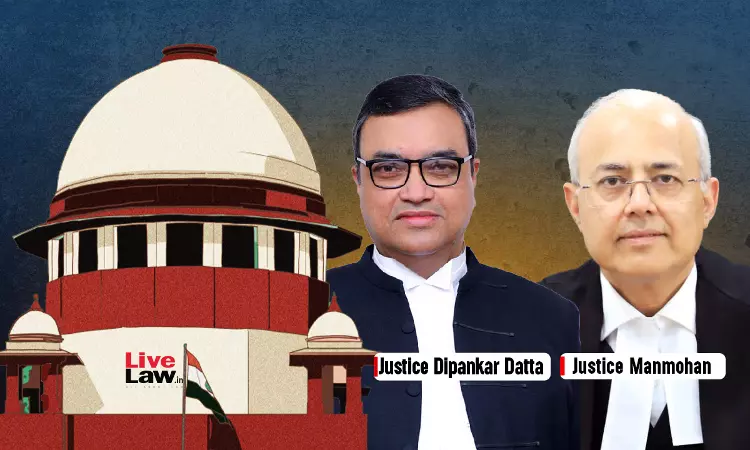- Home
- /
- Supreme court
- /
- Defendant Set Ex-Parte Can't...
Defendant Set Ex-Parte Can't Produce Evidence; Has Only Limited Right Of Cross-Examining Plaintiff : Supreme Court
Yash Mittal
23 April 2025 5:07 PM IST
The Supreme Court held that once a defendant is set ex parte, they are not entitled to present evidence in their defence; their only available recourse is to cross-examine the plaintiff's witness in an attempt to disprove the plaintiff's case. While reiterating that a defendant set ex-parte cannot lead evidence in their defence, the Court clarified that if a legal issue is raised in the...
The Supreme Court held that once a defendant is set ex parte, they are not entitled to present evidence in their defence; their only available recourse is to cross-examine the plaintiff's witness in an attempt to disprove the plaintiff's case.
While reiterating that a defendant set ex-parte cannot lead evidence in their defence, the Court clarified that if a legal issue is raised in the written statement such as one relating to limitation or jurisdiction, the court may frame and decide that issue based on the pleadings alone, without requiring the defendant to present evidence. However, this exception does not apply when the defendant fails to cross-examine the plaintiff's witness, as the absence of cross-examination undermines the basis for setting aside the ex parte decree.
“Once the pleadings are complete but the defendant is set ex parte, and such order has attained finality, the defendant's rights suffer a curtailment. He cannot produce evidence in defence and hence statements, which are in the nature of factual assertions, cannot be proved by leading evidence. Generally speaking, the limited right that the defendant, set ex parte, would have is confined to cross-examining the plaintiff's witnesses. The effort has to be directed towards demonstrating that they are not speaking the truth and, thereby, demolish the case of the plaintiff. Essentially, therefore, in such a case the defendant has to convince the court that the case put up by the plaintiff is so false that the court ought not to accept it. However, if the defendant raises an issue on law which is traceable in the written statement, for instance, the suit is barred by limitation or Section 9, CPC is attracted, or if the relief claimed in the suit cannot be granted for reasons disclosed, the requirement of the defendant proving such defence as raised in the written statement by leading evidence may not arise and the court may frame an issue of law and decide the same.”, the court observed.
Background
The bench comprising Justice Dipankar Datta and Justice Manmohan was hearing the case where the Allahabad High Court, in exercise of its supervisory jurisdiction under Article 227 of the Constitution, set aside the trial court's decision to pass an ex-parte decree in the Appellant's favour.
Aggrieved by the passing of the ex parte decree against him, prompted the Respondent to file an application under Order IX Rule 13 CPC for setting aside the ex-parte decree before the trial court. Following the dismissal of an application by the trial court, the Respondent/defendant approached the District Court, however it resulted in the same fate.
Following this, a writ petition was preferred by the Respondent before the High Court arguing that because a legal issue was raised in an Order IX Rule 13 CPC application, therefore the trial court erred in not framing the issue. Resultantly, the High Court allowed the petition restoring the suit, setting aside the ex-parte decree.
Assailing the High Court's decision, the plaintiff/Appellant moved to the Supreme Court.
Decision
Overturning the High Court's decision, the judgment authored by Justice Datta noted that the High Court erred in setting aside the ex-parte decree against the respondent/defendant.
The Court emphasized that, in the absence of any cross-examination of the appellant/plaintiff's witness by the respondent/defendant, it was not justified to allow the application to set aside the ex-parte decree, even if a legal issue had been raised in the written statement.
“The little detail that is decipherable from the written statement of the respondents is that in view of a local enactment with regard to the Zamindari system, the respondents claimed that the trial court did not have jurisdiction. Nevertheless, it does appear that other issues were framed and since the respondents did not cross examine the appellant, whatever he deposed was believed and accepted. We are left to wonder how the judgment of the trial court could have been faulted and the decree set aside on the ground that the defence raised in the written statement was not considered while granting relief. The observations of the learned Judge cannot be countenanced with reference to any provision of law or binding precedent.”, the court observed.
In terms of the aforesaid, the Court allowed the appeal.
Case Title: KANCHHU VS. PRAKASH CHAND & ORS.
Citation : 2025 LiveLaw (SC) 460
Click here to read/download the judgment
Appearance:
For Petitioner(s) :Mr. P.S. Datta, Sr. Adv. Mr. Sanjay Kumar Chatterjee, Adv. Mr. Sunil Kumar Pandey, Adv. Mr. Paramhans Sahani, Adv. Mr. Hemant Kumar Niranjan, Adv. M/S. Brajesh Pandey & Associates, AOR
For Respondent(s) :Mr. Sukumar Pattjoshi, Sr. Adv. Mr. Kiran Kumar Patra, AOR Mr. Preetish Sahu, Adv.



